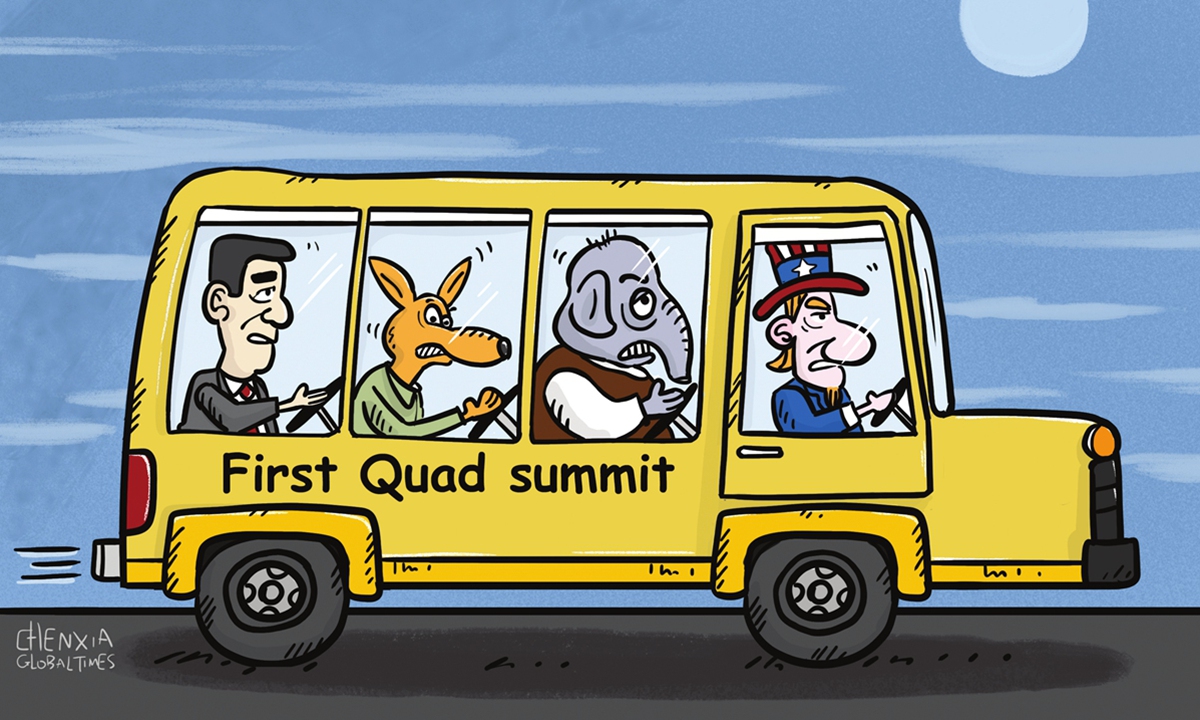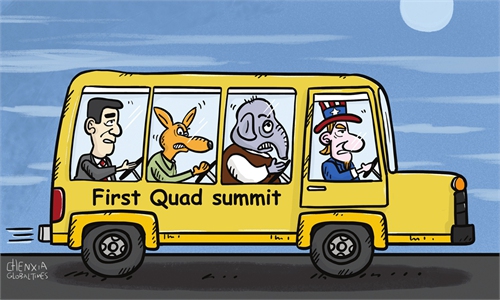
First Quad summit Illustration: Chen Xia/GT
Promises by the US and its allies to pump up India's COVID-19 vaccine production capacity to 1 billion doses by the end of 2022 across Asia is more of an exchange of interests, and whether this effort is able to supply vaccines to developing countries is still a question mark, Chinese analysts said, amid India's complacency that its vaccine diplomacy is getting a boost.
Leaders of the US, Australia, India and Japan pledged at their first Quad summit on Friday to boost India's vaccine production capacity by enabling it to produce at least 1 billion doses of vaccines by the end of 2022.
The US and Japan will fund Indian manufacturer Biological E to undertake production, including of Johnson & Johnson vaccines, via the US International Development Finance Corp and Japan International Cooperation Agency, the Straits Times reported.
Media Livemint called this plan the "key and concrete takeaway" of the Quad meeting and India Today quoted Indian Prime Minister Narendra Modi, who wrote "United in our fight against COVID-19, we launched a landmark Quad partnership to ensure accessibility of safe COVID-19 vaccines."
While India and its media were thrilled to give this news high-profile coverage, Chinese experts said that the plan is more of an exchange of interests. It satisfies the US' tactic of roping in India as its firm supporter to contain China's growing influence in the Asian region, as well as fulfilling India's long-held ambition to boost its soft power and counter China in vaccine diplomacy.
The Quad's intention to deliver vaccines to countries across Asia could easily end up being nothing because India itself is still in urgent need of vaccines, and the 1 billion doses will be likely delivered to members of Quad, Japan, Australia and the US first before it provides the leftovers to other countries in Asia, Liu Zongyi, secretary-general of the Research Center for China-South Asia Cooperation at the Shanghai Institutes for International Studies, told the Global Times.
Indian reports said only 1.58 percent of India's 1.35 billion population had been vaccinated so far.
Besides these uncertainties, Tian Guangqiang, an assistant research fellow with the National Institute of International Strategy at the Chinese Academy of Social Sciences, told the Global Times on Sunday that India's vaccine industry is known for its high production, high speed and low prices.
Given this, the US and US-based pharmaceutical companies will not be willing to transfer core technology to India and give India a chance to challenge the US' leading position in vaccine research and development.
"Transferring core technology to India is equivalent to pressing the green button for generic drugs, which are controversial and contain safety risks. In the end, the vaccine plan may be merely a gesture, used by the US and India as leverage to contain China," Tian said.
Some other uncertainties exist in terms of India's vaccine safety and efficacy, especially following vaccination deaths related to AstraZeneca vaccines produced by India, experts noted.
Several countries including Denmark, Norway and Iceland had paused the use of the shot produced by India as a precaution after reports of recipients developing blood clots and deaths, AFP reported. India has given at least 28 million shots in its vast vaccination program, most of them AstraZeneca's, which are produced at the Serum Institute of India.
It is also worth mentioning that the goal to pump up India's vaccine production capacity was signed at the meeting of the Quad, an alliance of security, which is mainly used by the US to rope in India, which has always maintained a swaying stance in choosing sides between the US and China, experts said.
Liu said that India is very inclined toward the US' Indo-Pacific Strategy. India is gradually breaking the balance. If it goes further down this road, it will eventually lose its strategic autonomy and become the US' hatchet man against China in the Indo-Pacific region, or even cannon fodder.
China has no intention to compete with India in so-called vaccine diplomacy, and it would be very likely to conduct cooperation in supplying vaccines to the countries where they are most needed, experts said, adding that it is disappointing that the Quad uses vaccine cooperation as a political means to curb China.



